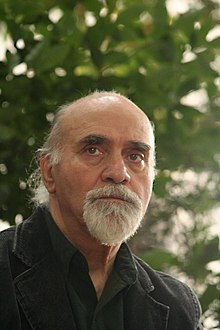Reza Baraheni
Reza Baraheni | |
|---|---|
 | |
| Born | (1935-12-13)13 December 1935 Tabriz, Iran |
| Died | 25 March 2022(2022-03-25) (aged 86) Toronto, Canada |
| Nationality | Iranian |
| Occupation(s) | Novelist, poet and critic |
Reza Baraheni (Persian: رضا براهنی; 13 December 1935 – 25 March 2022[1]) was an Iranian[2] novelist, poet, critic, and political activist.
Baraheni was born in Tabriz, Iran, in 1935. [3] After studying there and in Turkey, he obtained a Ph.D. in English literature from the University of Istanbul, and in 1963 was appointed Professor of English at Teheran University.[4]
Baraheni lived in Toronto, Canada, where he used to teach at the Centre for Comparative Literature at the University of Toronto.
He was the author of more than fifty books of poetry, fiction, literary theory, and criticism, written in Persian and English.[citation needed]
His works have been translated into a dozen of languages.[citation needed] His book, Crowned Cannibals, is accused by a few of containing some fabrications.[5] Moreover, he translated into Persian works by Shakespeare, Kundera, Mandelstam, Andrić, and Fanon.
Winner of the Scholars-at-Risk-Program Award of the University of Toronto and Massey College, Baraheni taught at the University of Tehran, Iran,[citation needed] the University of Texas at Austin, Indiana University in Bloomington, Indiana, the University of Maryland, Baltimore County, and York University. He was also a Fellow of St. Antony's College, Oxford University, Britain, Fellow of the University of Iowa, Iowa City, and Fellow of Winters College, York University. He was president of PEN Canada.
He died on 24 March 2022 in Toronto, Canada, and was buried on 9 April 2022 at Elgin Mills Cemetery, Canada.
Bibliography
English
- God's shadow : prison poems (Indiana University Press, Bloomington - 1976)
- The crowned cannibals: Writings on repression in Iran (Random House, Vintage, New York - 1977, introduction by E. L. Doctorow)
Anthologies
- Approaching Literature in the 21st Century - ed. Peter Schakel and Jack Ridl (Bedford/St. Martin’s, Boston - 2005)
- God’s Spies - ed. Alberto Manguel (Macfarlane, Walter & Ross, Toronto - 1999)
- The Prison where I Live, ed. Siobhan Dowd, Foreword by Joseph Brodsky (Cassell, London - 1996)
French
Novels
Written in Persian:
- Les saisons en enfer du jeune Ayyaz (Pauvert - Paris, 2000)
- Shéhérazade et son romancier (2ème éd.) (Fayard - Paris, 2002)
- Elias à New-York (Fayard - Paris, 2004)
- Les mystères de mon pays - vol. 1 (Fayard - Paris, 2009)
- Les mystères de mon pays - vol. 2 (Fayard - Paris, to be published 2012)
Short stories and other texts
- Lilith (Fayard - Paris, 2007)
- Une femme (remue.net - Paris, 2007)
- Le poète comme prisonnier (remue.net - Paris, 2007)
- L'aveuglement exilique (remue.net - Paris, 2007)
Poems
- Aux papillons (excerpts) (Revue Diasporiques n°11 - Paris, 2010)
Notes
References
- ^ "رضا براهنی، شاعر و نویسنده برجسته ایرانی، درگذشت". رادیو فردا. 25 March 2022.
- ^ The Rising Tide of Cultural Pluralism: The Nation-State at Bay? by Crawford Young, 1993, p. 126.
- ^ Baraheni, Reza (1976). "The Shah's executioner". Index on Censorship. 5: 13–20. doi:10.1080/03064227608532493. S2CID 144161173.
- ^ Baraheni, Reza (1976). "The Shah's executioner". Index on Censorship. 5: 13–20. doi:10.1080/03064227608532493. S2CID 144161173.
- ^ Rewriting the Iranian Revolution: https://newrepublic.com/article/143713/rewriting-iranian-revolution
External links
- Open Library
- v
- t
- e
Contemporary | |||||||||||||||||||||||||||||
|---|---|---|---|---|---|---|---|---|---|---|---|---|---|---|---|---|---|---|---|---|---|---|---|---|---|---|---|---|---|
| |||||||||||||||||||||||||||||











